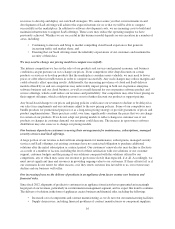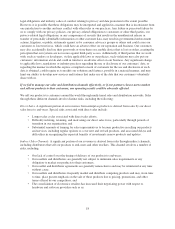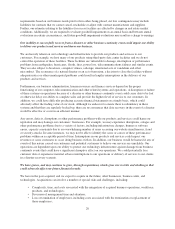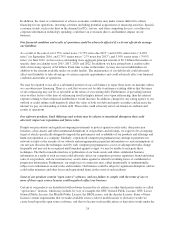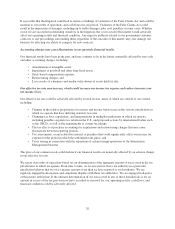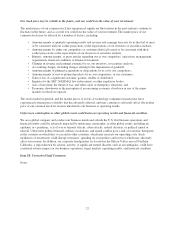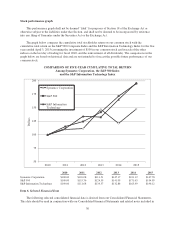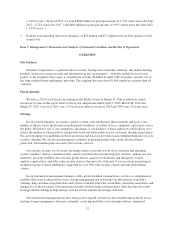Symantec 2015 Annual Report Download - page 103
Download and view the complete annual report
Please find page 103 of the 2015 Symantec annual report below. You can navigate through the pages in the report by either clicking on the pages listed below, or by using the keyword search tool below to find specific information within the annual report.terms of a particular open source license or other license granting third parties certain rights of further use. By the
terms of certain open source licenses, we could be required to release the source code of our proprietary software
if we combine our proprietary software with open source software in a certain manner. In addition to risks related
to license requirements, usage of open source software can lead to greater risks than use of third party
commercial software, as open source licensors generally do not provide warranties or controls on origin of the
software. We have established processes to help alleviate these risks, including a review process for screening
requests from our development organizations for the use of open source, but we cannot be sure that all open
source is submitted for approval prior to use in our products. In addition, many of the risks associated with usage
of open source cannot be eliminated, and could, if not properly addressed, negatively affect our business.
If we are unable to adequately address increased customer demands on our technical support services, our
relationships with our customers and our financial results may be adversely affected.
We offer technical support services with many of our products. We may be unable to respond quickly enough to
accommodate short-term increases in customer demand for support services. We also may be unable to modify
the format of our support services to compete with changes in support services provided by competitors or
successfully integrate support for our customers. Further customer demand for these services, without
corresponding revenues, could increase costs and adversely affect our operating results.
We have outsourced a substantial portion of our worldwide consumer support functions to third party service
providers. If these companies experience financial difficulties, do not maintain sufficiently skilled workers and
resources to satisfy our contracts, or otherwise fail to perform at a sufficient level under these contracts, the level
of support services to our customers may be significantly disrupted, which could materially harm our
relationships with these customers.
We sell products to the U.S. government under contracts that include special compliance obligations and
subject us to audits and reviews by various agencies of the U.S. government. Any failure to meet these
obligations, or an adverse outcome in an audit or investigation, could result in civil damages and/or penalties
being assessed against us by the government.
We have sold products through our GSA Schedule contract. Our GSA Schedule contract contains provisions that
require us to provide customers purchasing through that contract with negotiated favorable pricing as compared
to certain non-federal customers, and requires us to monitor aspects of our commercial sales practices to ensure
compliance with that pricing obligation. In the ordinary course of business, sales under our GSA Schedule
contract may be subject to audit or investigation by the U.S. government. Noncompliance with the provisions of
the contract identified as a result of such reviews (as well as noncompliance identified on our own) could subject
us to damages and other penalties, which would adversely affect our operating results and financial condition.
On June 4, 2012, we were advised by the Commercial Litigation Branch of the Department of Justice’s Civil
Division and the Civil Division of the U.S. Attorney’s Office for the District of Columbia that the government is
investigating our compliance with certain provisions of our GSA Schedule contract, including provisions relating
to pricing, country of origin, accessibility, and the disclosure of commercial sales practices. The Department of
Justice has requested that we preserve, among other things, all records relating to GSA Schedule contracting
activity. As reported on the GSA’s publicly-available database, our total sales under the GSA Schedule contract
were approximately $222 million from the period beginning January 2007 and ending September 2012. In 2012,
a sealed civil lawsuit was filed against Symantec related to compliance with the GSA Schedule contract and
contracts with California, Florida, and New York. In July 2014, following expiration of the Court-imposed seal,
the U.S. government intervened in the lawsuit and in September 2014, the states of California and Florida
intervened in the lawsuit, and the state of New York notified the Court that it would not intervene. In October
2014, the Department of Justice filed an amended complaint, which did not state a specific damages amount, and
California and Florida combined their claims with those of the Department of Justice and the relator on behalf of
New York in an Omnibus Complaint. The state claims also do not state specific damages amounts.
25



